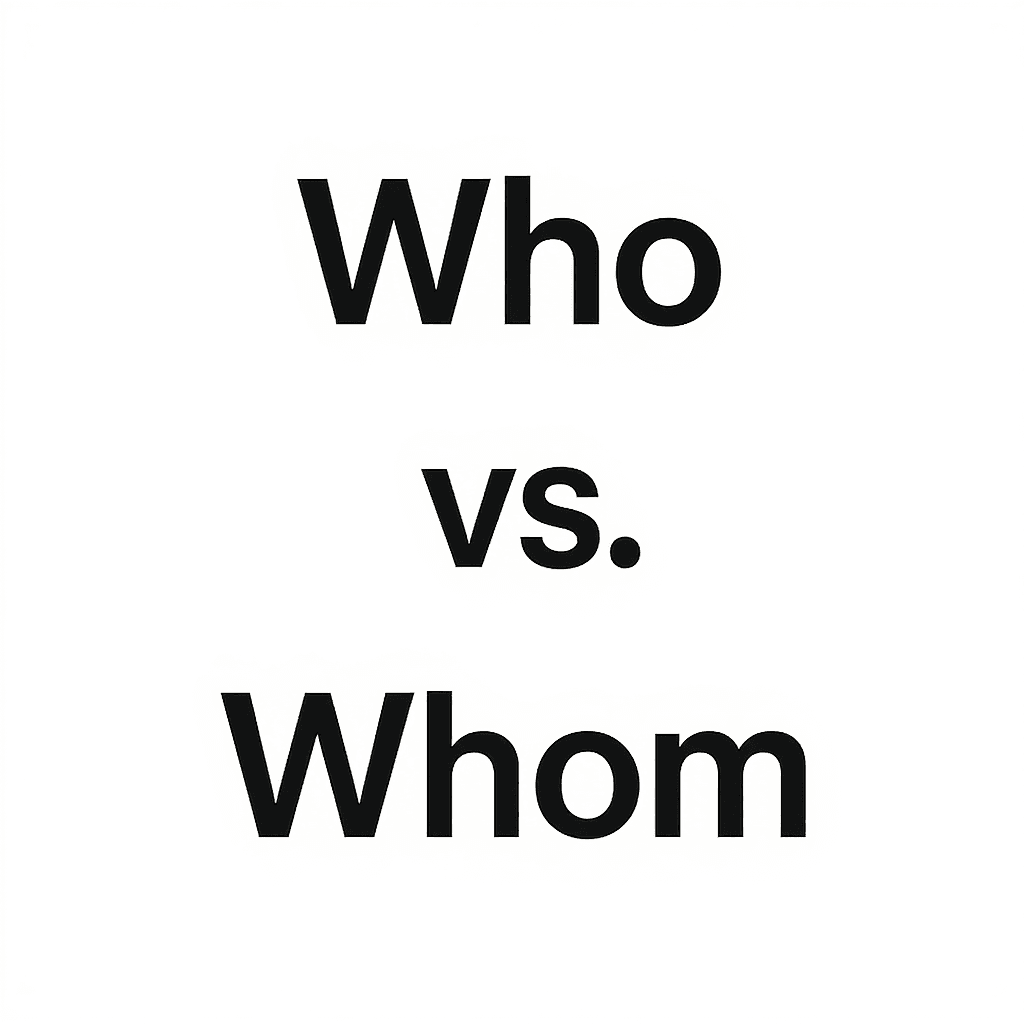“Who” vs. “Whom”: What’s the Difference?
 Who and whom are both pronouns, but they play different roles in a sentence.
Who and whom are both pronouns, but they play different roles in a sentence.
The difference depends on whether the word is the doer of the action or the receiver of it.
Let’s make it simple.
Who: The Doer of the Action
Meaning
“Who” is used as the subject of a sentence — the one doing the action.
It answers the question: Who is doing something?
Examples of “Who” (10 total)
- Who is calling me right now?
- Do you know who won the game?
- I wonder who left this note.
- Who ate the last cookie?
- She’s the one who helped me move.
- Who told you that secret?
- Who made this amazing cake?
- I don’t know who started the rumor.
- Who should I contact about the job?
- Guess who is coming to dinner tonight!
🧠 Tip:
If the person is doing something, use who.
Whom: The Receiver of the Action
Meaning
“Whom” is used as the object of a verb or preposition — the one receiving the action.
It answers the question: To whom? For whom? With whom?
Examples of “Whom” (10 total)
- To whom should I send this letter?
- Whom did you invite to the party?
- With whom are you traveling?
- I don’t know whom she met at the café.
- The person whom you saw was my cousin.
- For whom did you buy these flowers?
- Whom are you talking about?
- The man whom they hired is very skilled.
- Whom did she choose for the project?
- To whom it may concern.
🧠 Tip:
If the person is having something done to them, use whom.
Quick Comparison Table
| Role | Pronoun | Example | Hint |
|---|---|---|---|
| Subject (the doer) | Who | Who made this cake? | Replace with he/she |
| Object (the receiver) | Whom | To whom did you speak? | Replace with him/her |
Simple Trick to Remember
Try replacing the word with he/she or him/her:
- If he/she fits → use who
- If him/her fits → use whom
Example:
Who/Whom did you see? → You saw him → ✅ Use whom
Who/Whom called you? → He called me → ✅ Use who
Why It Still Matters
In everyday speech, many people use who for everything — even when whom is technically correct.
But in formal writing, whom still sounds more polished and professional.
That’s why tools like Humanizey can help fix these subtle grammar issues automatically, making AI-written text sound naturally correct and human.
FAQs
1. Is it wrong to always use “who”?
Not always. In casual speech, who is accepted almost everywhere, but in formal writing, whom is preferred when it’s the object.
2. Why do we still use “whom”?
Because English keeps some traditional grammar distinctions — it adds clarity and formality in writing.
3. Can “whom” start a question?
Yes! Example: Whom did you invite? It’s perfectly correct (though many people just say Who did you invite?).
4. How can I test which one to use quickly?
Replace the word with he or him.
- He = who
- Him = whom
Practice: Choose the Correct Word (“Who” or “Whom”)
(Answers are listed at the end.)
- ___ is knocking at the door?
- To ___ should I address this email?
- Do you know ___ called earlier?
- ___ are you waiting for?
- I met the girl ___ you mentioned yesterday.
- ___ wants to come with me?
- The person with ___ I spoke was very polite.
- ___ did you lend your notes to?
- ___ wrote this beautiful poem?
- For ___ are you buying that gift?
Answers
- Who
- Whom
- Who
- Whom
- Whom
- Who
- Whom
- Whom
- Who
- Whom
